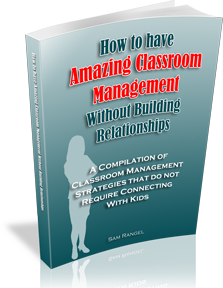As you know, after 23 years of being a classroom teacher, I’m working as an administrator.
I must admit, the view from this side of education is a lot different.
One of the conversations that I’m now privy to is the one about teacher ability. I’m quickly learning which teachers are seen in a positive light and which teachers are not. I’ve already had parents calling me to request I change their child’s teacher, because of one thing or another.
Administrators have to evaluate teachers, and although my position doesn’t require me to do this, I am around when the evaluations of teachers is being discussed.
Among the teachers who are being evaluated are those new teachers who are not yet tenured.
Tenure, for those who don’t know what this is, is when you are basically un-fireable. I made that word up. Although you still may be evaluated, the administration will have a harder time firing your for poor performance.
In my district, a teacher becomes tenured after a probation period of two years.
It’s the evaluating administrator who has to determine within those two years if the probationary teacher is qualified to become tenured. Once that second year is over, the administrator knows that it will be very difficult to remove that teacher should it become evident that the teacher isn’t qualified.
Some administrators have a hard time telling a probationary teacher that he/she will not be asked to return for his/her third year, and they end up having to deal with that decision for years to come with a poor performing teacher.
I have my own opinion about tenure and its relevance, but that’s for another post.
I thought it would be a good idea to offer some advice to those probationary teachers who are looking for ways to make it to tenure.
I call it:
Ten Tips to Tenure
Here they are:
Keep Your Students Engaged– One of the main reasons why teachers get a bad reputation is because they don’t know how to control their class. Poor classroom management will prevent a teacher from teaching and student from learning. When students are engaged, classroom management takes care of itself. You want your students to be paying attention and participating in the lesson when the administrator comes in for the evaluation. I believe the primary focus of any new teacher is learning how to keep students engaged. Be open to new strategies. Ask veteran teachers for ideas on keeping students’ attention in class. Learn to keep your students engaged, and you’ll be teaching for as long as you want to.
Start a club – Administrators like to say to parents that there are after-school clubs that their students take advantage of. If you’re the teacher who is giving of your time to help students, the administrator will think twice before letting you go. Create a club about something that you’re passionate about. Just make sure that it has something that benefits kids.
Don’t send a lot of students to the office – I’ve learned that one of the statistics that some administrators compile is the number of times a teacher refers a student to the office for discipline. There are times when students need to be sent to the office, but as a new teacher, you have to do your best to handle as many problems in the classroom.
Communicate with parents – Get the parents on your side. I know it sounds political, but parents can be your biggest fans or your greatest threat. Parents talk to administrators. What do parents talk to administrators about? Yup. They talk about teachers. You want them to say good things about you, instead of complaining about you.
Dress professionally – This is an easy one. No administrator wants his/her staff looking like slobs.
Volunteer for committees – Get involved. Administrators don’t like to beg teachers to be part of committies. If you’re one that they can count on, it will go a long way to increase your worth. You will also be around other teachers who can offer valuable information to new teachers.
Use technology – Technology is becoming more and more a part of education. Become the technology expert at your school. Be that go-to tech guy/gal that can show the older teachers how to do stuff with the computer.
Connect with mentors – Get yourself involved in a Professional Learning Network (PLN). With the advent of the Internet, teachers can connect with other teachers all around the world. Reading this blog post demonstrated that you are already doing this. I wish I had the Internet when I started teaching.
Stay away from negative teachers – I’ve seen new teachers get their youthful save-the-world enthusiasm quenched by negative teachers, and it makes me mad. Unfortunately, there are teachers out there who are burned out, and who are looking for new reasons to complain about the administration, the district, the parents, kids, etc. Stay away from them. Find a happy teacher. Be their best friend. Adminstrators can’t get rid of the veteran complainer, but getting rid of the probationary teacher who complains will make the administrator happy.
Keep learning – Read books about teaching strategies. Subscribe to blogs about teaching. Ask questions of successful veteran teachers. Ask administrators for advice. They like this. Trust me. No administrator wants a know-it-all on their staff, especially a probationary know-it-all.
I need to clarify that you can’t just do one of these tips and expect to be safe when tenure time comes around. I also would hope that after you attain tenure, that you wouldn’t abandon these strategies just because you’re safe.
Am I missing anything?
Is there anything else that tenured teachers would like to add to this list?
Good luck!
Thanks,
Sam
Photo by: http://www.flickr.com/photos/maeghen17/



